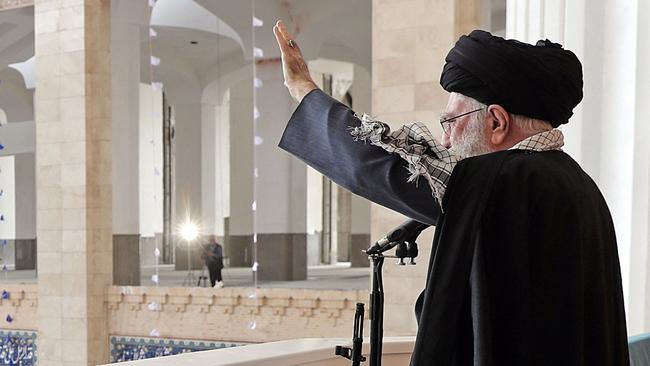Patient ayatollahs gather ‘the enemies of their enemy’
The Iranian regime courts friends and foes alike to form its alliance against the West.

When the Houthi rebels, a tribal militia little known in the West, stormed into Sanaa a decade ago and drove out Yemen’s president, their backers in Iran celebrated.
A fourth Arab capital had “joined the Islamic revolution”, as one politician in Tehran put it. As he saw it, Baghdad, Damascus and Beirut were already under Iranian control. Critics thought Tehran mayor Alireza Zakani was speaking prematurely. But as if to prove his point, this weekend’s missile storm was launched at Israel from Yemen, Iraq and Lebanon, as well as Iran. Tehran ordered it in retaliation for Israel bombing Islamic Revolutionary Guard generals in Syria.
How Israel should handle this threat, which is backed up by rhetoric asserting the Islamic Republic’s religious and historic duty to destroy it as a Zionist state, is one of the great dividing lines of global politics. How Iran achieved this position is much clearer to see.
When the last shah was overthrown in 1979, Iran removed itself at a stroke from the Western sphere of influence to a position at the head of two broad movements – Shia Islamism and “revolutionary anti-imperialism”. Since then, its two supreme leaders, Ayatollah Ruhollah Khomeini and Ayatollah Ali Khamenei, have adjusted their tactics but stayed true to the strategy of entwining these two ideas to win a diverse array of allies around the world. A theocratic state, it developed its missile program with support from atheist, communist North Korea. It co-operates on avoiding US sanctions on its oil exports with socialist Venezuela.
Though strongly influenced by the Sunni Muslim Brotherhood, it nevertheless defended the Assad regime against Sunni Islamist militias of all stripes in the Syrian civil war. It did so alongside Russia, which despite the alliance with Tehran promoted President Bashar al-Assad as a bulwark against radical Islam. Iran continues to send weapons to Russia for use against Ukraine.
These friendships were forged because in the Middle East, as much as everywhere else, “the enemy of my enemy is my friend”, and these countries were historically enemies of either the US or Israel, or both.
The Iranian mission has been conducted globally. Operatives have conducted bombings in Argentina and assassinations in Europe, and run drug shipments for money through Africa.
But it has almost always employed front organisations, the most successful of which, and the model for many of the others, has been Hezbollah in Lebanon. Khomeini forged links with Shia factions fighting in Lebanon’s civil war even before coming to power and used the chaos of early 1980s Beirut to build a militia that would challenge the American presence there. In Lebanon itself, Hezbollah now has no rival strong enough to disarm its massive arsenal of missiles pointed at Israel. It claims to have 150,000, and Iran’s engineers continue to improve their accuracy.
Iran’s supporters point out, correctly, that it too is under threat. For all its militias, it has little in the way of brute force to compete with the US Navy or even the Israeli air force, if it comes to out-and-out combat. The US and allies such as Britain have their own military bases, from Cyprus to Qatar.
This is why Iran’s direct military interventions, such as on Saturday night, seem so choreographed. Its strategy depends on provoking Israel but not to the extent of an all-out war. Instead it seeks to build pressure gradually, over years.
Western voters will sooner or later cease to tolerate the cost in civilian lives of Israel’s response to provocations such as the October 7 attack. This may be wishful thinking, and it is certain that before it happens tens of thousands more people, mostly Palestinians, would have to die. But every time pro-Palestinian activists rally against President Joe Biden, or Donald Trump calls for an end to America’s “forever wars”, Tehran believes victory has moved a day closer.
The Times


